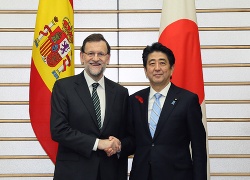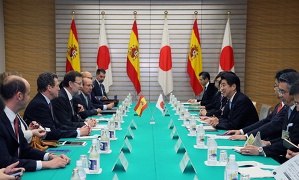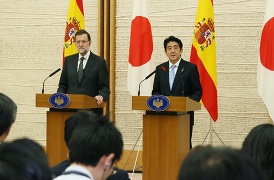Countries & Regions
Japan-Spain Summit Meeting and Working Dinner
October 3, 2013

 (Photo: Cabinet Public Relations Office)
(Photo: Cabinet Public Relations Office)
 (Photo: Cabinet Public Relations Office)
(Photo: Cabinet Public Relations Office)
 (Photo: Cabinet Public Relations Office)
(Photo: Cabinet Public Relations Office)
On October 3, commencing at 5: 50 p.m. for approximately 45 minutes, Mr. Shinzo Abe, the Prime Minister, held a meeting with H.E. Mr. Mariano Rajoy Brey, President of the Government of Spain, who was on an official working visit to Japan. Following the meeting, commencing at 7: 10 p.m. for approximately one and a half hours, Prime Minister Abe held a working dinner with President Rajoy. An overview of the meeting and the working dinner is as follows:
1. At the Beginning
(1) Prime Minister Abe heartily welcomed President Rajoy’s visit to Japan on the occasion of the opening of the “400th Anniversary of Japan-Spain Relations.” While introducing a fact that two years before the dispatching of the Keicho Mission to Europe (in 1613), an earthquake and tsunami had also struck the Tohoku region, Prime Minister Abe also stated that he would like to further deepen the 400-year relations between the two countries through the events to celebrate the anniversary.
(2) In response to this, President Rajoy expressed his gratitude for the invitation and at the same time congratulated the successful bid to host the 2020 Olympic and Paralympic Games in Tokyo.
(3) In response to the above, Prime Minister Abe expressed his gratitude for the congratulations and stated that he would like many people of Spain to visit Japan on this occasion.
2. Importance of Spain for Abe Administration’s Diplomacy
(1) Prime Minister Abe stated that Spain has significance in the following three areas for Japan:
(A) a partner that shares values, history, and culture and a country sharing deep understanding of the importance of freedom and stability of the ocean; (B) a country which has a deep experience and network in Latin America and the Caribbean and can create cooperative relations together connecting Asia, Europe, and Latin America and the Caribbean; and (C) a partner that promotes innovation and realizes economic growth together.
(2) In response to the above, President Rajoy stated that what Prime Minister Abe pointed out as characteristics of Spain are important and there still exists potential in the cooperation between Japan and Spain.
3. Field of Politics and Security
(1) Prime Minister Abe stated that security of the Asia-Pacific region and Europe are closely interlinked and deepening the understanding of each of their security environments would be beneficial for both sides. Then, Prime Minister Abe added that he would like to begin exchanges between defense authorities of the two countries at an early date and promote exchanges of opinions and sharing of information concerning the defense policies and security environment of the two countries.
(2) In response to the above, President Rajoy stated that progress of cooperation between defense authorities of Japan and Spain would be very desirable.
(3) Moreover, the two leaders also exchanged opinions on the situations in Asia, the Middle East, and Africa.
4. Human Exchanges
(1) Prime Minister Abe stated the following three issues for the deepening of bilateral relations: (A) an early introduction of the working holiday program between the two countries; (B) the expansion of opportunity for Japanese education in Spain; and (C) further exchanges between Parliamentarians of the two countries.
(2) In response to the above, President Rajoy stated that he would like to realize the early introduction of the working holiday program to activate exchanges between the youth of the two countries and also to promote tourism between Japan and Spain. Thus, the two leaders shared the view on these issues.
5. Latin America and the Caribbean
(1) Prime Minister Abe stated that he would like to closely exchange information and opinions on policies regarding Latin America and the Caribbean and that when Japan’s participation as an observer to the Ibero-America Summit is realized, he would like to utilize this framework of exchanges to deepen coordination with Spain on policies regarding Latin America and the Caribbean.
(2) In response to the above, President Rajoy stated that Latin America and the Caribbean is historically, culturally, and linguistically important for Spain and there is a huge possibility of cooperation between the two countries particularly in fields such as the promotion of export to Latin America and the Caribbean and Asia. Moreover, President Rajoy added that Japan and Spain can cooperate in the Pacific Alliance and Ibero-America Summit.
6. Coordination with Spain for Realization of the Growth Strategy
(1) Priorities of the growth strategy
A. Prime Minister Abe gave an explanation on his economic policies and effects of such policies and stated that for the purpose of realizing the growth strategy, Spain and Japan, which have high “innovation capability,” can make the most of their capabilities particularly in fields such as medicine, renewable energy, and infrastructure.
B. In response to the above, President Rajoy stated that economic reconstruction and economic growth are also priorities for Spain and that he would like to proceed with inter-industrial cooperation between Japan and Spain.
C. The two leaders shared the view that they will strengthen cooperation in the field of renewable energy, based on on-going cooperation in the city of Malaga between the New Energy and Industrial Technology Development Organization (NEDO) and concerned organizations of Spain as a model case.
D. Moreover, the two leaders also shared views on transmitting the culinary culture of Japan and Spain, which have many common points, together in a third country.
(2) Cooperation in the market of developing countries
Prime Minister Abe stated that Japan and Spain had obtained knowledge and network in trade and investment, respectively, in Asia and Latin America and the Caribbean and suggested that the two countries would provide such “assets” to each other for future advancement into markets of developing countries. President Rajoy agreed with the suggestion.
(3) In addition to the above, the two leaders shared the view on the importance of an early conclusion of the Japan-EU Economic Partnership Agreement (EPA) and further exchanges between Parliamentarians of Japan and Spain.
1. At the Beginning
(1) Prime Minister Abe heartily welcomed President Rajoy’s visit to Japan on the occasion of the opening of the “400th Anniversary of Japan-Spain Relations.” While introducing a fact that two years before the dispatching of the Keicho Mission to Europe (in 1613), an earthquake and tsunami had also struck the Tohoku region, Prime Minister Abe also stated that he would like to further deepen the 400-year relations between the two countries through the events to celebrate the anniversary.
(2) In response to this, President Rajoy expressed his gratitude for the invitation and at the same time congratulated the successful bid to host the 2020 Olympic and Paralympic Games in Tokyo.
(3) In response to the above, Prime Minister Abe expressed his gratitude for the congratulations and stated that he would like many people of Spain to visit Japan on this occasion.
2. Importance of Spain for Abe Administration’s Diplomacy
(1) Prime Minister Abe stated that Spain has significance in the following three areas for Japan:
(A) a partner that shares values, history, and culture and a country sharing deep understanding of the importance of freedom and stability of the ocean; (B) a country which has a deep experience and network in Latin America and the Caribbean and can create cooperative relations together connecting Asia, Europe, and Latin America and the Caribbean; and (C) a partner that promotes innovation and realizes economic growth together.
(2) In response to the above, President Rajoy stated that what Prime Minister Abe pointed out as characteristics of Spain are important and there still exists potential in the cooperation between Japan and Spain.
3. Field of Politics and Security
(1) Prime Minister Abe stated that security of the Asia-Pacific region and Europe are closely interlinked and deepening the understanding of each of their security environments would be beneficial for both sides. Then, Prime Minister Abe added that he would like to begin exchanges between defense authorities of the two countries at an early date and promote exchanges of opinions and sharing of information concerning the defense policies and security environment of the two countries.
(2) In response to the above, President Rajoy stated that progress of cooperation between defense authorities of Japan and Spain would be very desirable.
(3) Moreover, the two leaders also exchanged opinions on the situations in Asia, the Middle East, and Africa.
4. Human Exchanges
(1) Prime Minister Abe stated the following three issues for the deepening of bilateral relations: (A) an early introduction of the working holiday program between the two countries; (B) the expansion of opportunity for Japanese education in Spain; and (C) further exchanges between Parliamentarians of the two countries.
(2) In response to the above, President Rajoy stated that he would like to realize the early introduction of the working holiday program to activate exchanges between the youth of the two countries and also to promote tourism between Japan and Spain. Thus, the two leaders shared the view on these issues.
5. Latin America and the Caribbean
(1) Prime Minister Abe stated that he would like to closely exchange information and opinions on policies regarding Latin America and the Caribbean and that when Japan’s participation as an observer to the Ibero-America Summit is realized, he would like to utilize this framework of exchanges to deepen coordination with Spain on policies regarding Latin America and the Caribbean.
(2) In response to the above, President Rajoy stated that Latin America and the Caribbean is historically, culturally, and linguistically important for Spain and there is a huge possibility of cooperation between the two countries particularly in fields such as the promotion of export to Latin America and the Caribbean and Asia. Moreover, President Rajoy added that Japan and Spain can cooperate in the Pacific Alliance and Ibero-America Summit.
6. Coordination with Spain for Realization of the Growth Strategy
(1) Priorities of the growth strategy
A. Prime Minister Abe gave an explanation on his economic policies and effects of such policies and stated that for the purpose of realizing the growth strategy, Spain and Japan, which have high “innovation capability,” can make the most of their capabilities particularly in fields such as medicine, renewable energy, and infrastructure.
B. In response to the above, President Rajoy stated that economic reconstruction and economic growth are also priorities for Spain and that he would like to proceed with inter-industrial cooperation between Japan and Spain.
C. The two leaders shared the view that they will strengthen cooperation in the field of renewable energy, based on on-going cooperation in the city of Malaga between the New Energy and Industrial Technology Development Organization (NEDO) and concerned organizations of Spain as a model case.
D. Moreover, the two leaders also shared views on transmitting the culinary culture of Japan and Spain, which have many common points, together in a third country.
(2) Cooperation in the market of developing countries
Prime Minister Abe stated that Japan and Spain had obtained knowledge and network in trade and investment, respectively, in Asia and Latin America and the Caribbean and suggested that the two countries would provide such “assets” to each other for future advancement into markets of developing countries. President Rajoy agreed with the suggestion.
(3) In addition to the above, the two leaders shared the view on the importance of an early conclusion of the Japan-EU Economic Partnership Agreement (EPA) and further exchanges between Parliamentarians of Japan and Spain.

